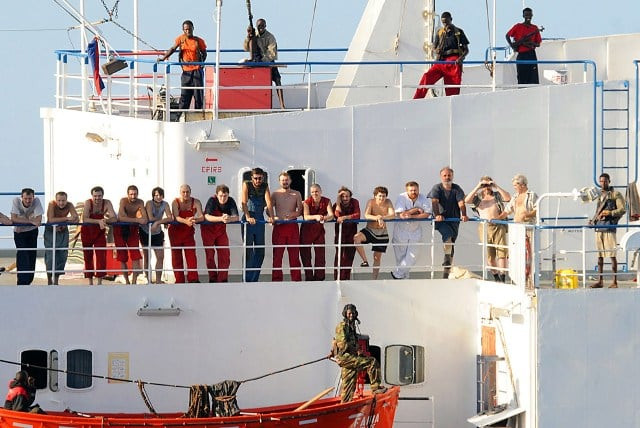Who are these pirates and how have they been in business for so long without being apprehended?
The Gulf of Aden off the coast of Somalia has been lucrative to many countries─ ironically, Somalia cannot be counted among them. European and Asian companies illegally fish for yellow-finned tuna robbing Somalia of millions of dollars a year in revenue.
Then some Italian masterminds came up with a brilliant plan. They made it possible for certain European countries to dump toxic waste in the waters for a fraction of the money they would pay to legally dispose of such materials. These acts devastated the fishing trade and caused debilitating diseases in the Somali coastal populations by radiation poisoning.
Not the people to take one on the chin, Somalis developed another trade; piracy. Initially what started as a rag-tag band of aggressive entrepreneurs, developed into an organised and well-equipped thriving business. Their ranks include accountants, computer experts and ex-Somali marines, and an infrastructure of a small navy with financial directors and admirals at its helm.
They are known to buy the most up-to-date weapons, some say from the Yemenis. They operate on fast boats, at times based off a mother ship, and are guided by the latest GPS technology.
Almost 30 navies have come together in an effort to deter the activities of these pirates. But, surprisingly, they have not been able to do much. The forces patrolling this area claim that they are spread too thin to be effective. When ship owners demanded a naval blockade or an all-out attack on the pirate bases, they were told that the sheer immensity of the coastline makes a blockade impossible, and no country wants to involve itself in an attack which may lead to more embarrassment than success.
As a deterrent, the US and British have allowed their freight ships to carry armed guards trained in anti-piracy techniques. But perhaps the safest ships are those flying the Russian flag. They simply blow the pirate boats out of the water and leave the survivors to drown.
In a Robin Hood-like twist, these pirates support schools and hospitals in the coastal towns. A percentage from the ransom money goes towards the towns’ hospitals, schools and other local services.
"Piracy-related business has become the main profitable economic activity in our area and as locals we depend on their output," said Mohamed Adam, the town's deputy security officer.
"The district gets a percentage of every ransom from ships that have been released, and that goes on public infrastructure, including our hospital [sic] and our public schools."
CNN reported that the pirates have also set up a stock exchange, where trades are made on future ransoms. Somali refugees from as far off as Canada invest great amounts of money. People trade commodities for shares. One woman traded a rocket launcher, which she received as a settlement in her marriage and ended up making quite a profit on its sale.
The tragedy hit home for the Pakistanis when our own people were taken. We witnessed our sympathetic media, parade before us crying children with folded hands and silent women with appeals screaming in their eyes. For this, we came together, collected money and negotiated, and we did all that so we could bring our people back home.
But a few amongst us wonder if this really had to happen.
The question is that despite global efforts, why does piracy still flourish?
Their headquarters are a few hundred miles from the capital of Somalia, but no action is taken against them. The navies of the world have come together but have yet to secure the coastline. They support terrorist organisations that have been the reason for the destruction of countries, but the world powers turn a blind eye to them.
Could the pirates be a mere distraction to keep prying eyes away from those particular waters?
Is there something more than just radioactive waters in the Gulf of Aden?
People speculate that secret pipelines are being laid, others ─ the more imaginative ones ─ claim that a gateway to the stars has been discovered and is being guarded by the new world order. I personally favour the former theory, but wish for the latter.
There is a lack of central governance in Somalia as the al Shahaab Islamist group, with ties to al Qaeda, wages a war with the western-backed and internationally recognized Transitional Federal Government.
In this case, the burden falls on the nations of the world.
Sadly, the countries that can make a difference are more interested in trade revenues than making a humanitarian effort. But then the question remains;
Is the solution really that simple ─ or is there something more that we don't know yet?
Follow Zeba on Twitter @zebansari



COMMENTS
Comments are moderated and generally will be posted if they are on-topic and not abusive.
For more information, please see our Comments FAQ